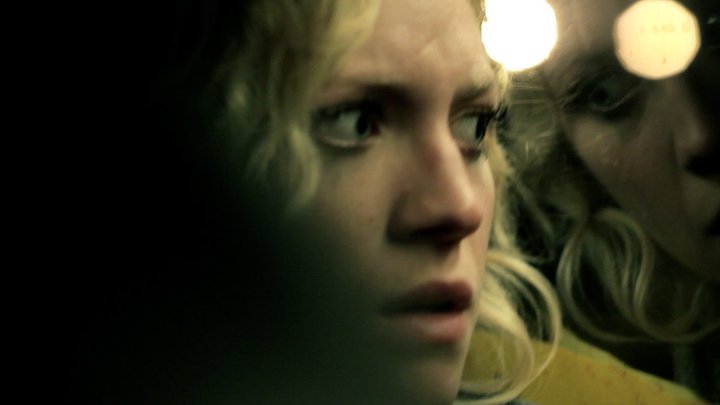No Time to Lose, by Rita Cannon
Going only off the plot summary, Aimee Lagos’ tense carjacking drama 96 Minutes might be easy to dismiss as a younger-skewed retread of Paul Haggis’ Crash. The parallels are certainly there – strangers from different sides of the tracks unexpectedly collide, sometimes literally and sometimes in cars. But while Crash was a sprawling morality play about racial tensions and urban disconnect that wore its thematic heart on its sleeve, Lagos’ film is much more specific and focused, the micro to Crash‘s macro.
The film opens on four kids in the middle of the aforementioned carjacking. High school senior Dre (Evan Ross), relatively calm, is driving the stolen vehicle, while his loud-mouthed younger friend Kevin (J. Michael Trautmann) rides shotgun. The car’s owner, pretty law student Carley (Brittany Snow) sits in the backseat crying and holding her friend Lena (Christian Serratos), who’s bleeding profusely after being shot in the head by Kevin. The film then leaps back in time to the beginning of that same day, before the two pairs of friends have met, and continues cutting back and forth between the aftermath of the crime and the events leading up to it.
The jumpy narrative, despite being used as a selling point in much of the film’s promotion, is actually its biggest weakness, for the simple reason that most of what happens before the carjacking is boring. I don’t mean that it’s spare and deliberately paced and mines the mundane for revelations about its characters. This isn’t Elephant. I mean that it lays out each character’s motivations in a baldly schematic way, reduces those characters to stereotypes, and forces them to clumsily foreshadow the impending disaster by saying things like, “I never should have gotten out of bed this morning.” Dre is an inner city kid struggling to find a path for himself outside of gang life, Kevin is aloose cannon from an abusive home who doesn’t see a future for himself at all, and Carley is a striver with a distant father who overachieves to win his approval. These clichés exist because they’re grounded in truth; it only takes a little extra work to transcend the cliché and make a character seem vital and real. Unfortunately, Lagos seems as bored with the set-up sequences as we are. They feel dashed off and perfunctory, and no one’s personality really comes to life until the crime is committed and things get dire.
The relationship between Dre and Carley fluctuates as the night goes on, and is played excellently by Ross and Snow. Stuck with the job of finishing what Kevin started, Dre shifts from Carley’s protector to her potential executioner and back again, and watching the two of them try to decide when they can and can’t trust each other is fascinating. The less interesting character, while simultaneously being the one who drives most of the action, is Trautmann’s Kevin. Kevin is really something. Despite the awful home life the film offers up as explanation, Kevin is the only character I felt absolutely no sympathy for. In addition to being callous, hotheaded and violent, Kevin has to be one of the dumbest people I have ever seen in a movie. Life on the streets has apparently reduced him to a bundle of primal urges, his ill-considered indulgence of which keeps making bad situations worse. This is exemplified in a bizarre scene in which Kevin turns to the weeping, blood-spattered Carley and asks, apparently in total seriousness, whether she’d like to have sex. She says no, so he starts gearing up to rape her at gunpoint, until Dre returns to the car and puts a stop to it. While I don’t doubt that people as awful as Kevin exist, the idea that someone as comparatively smart and conscientious as Dre would be friends with this person, much less screw up his own life in an effort to protect him, strains credulity.
Once 96 Minutes settles into itself, it’s a pretty good thriller with some serious emotional heft. Lagos wisely ends the film with a scene between Carley and Dre, the two strongest characters whose fates we care about most. This scene doesn’t offer a lot of closure, but that’s fine – Carley and Dre don’t get much, either. The film is far from perfect, but it shows us a compelling relationship between people in high-stakes, unpredictable circumstances. If viewers are willing to look past the sometimes-trite set dressing, most will be happy with what they find.




























